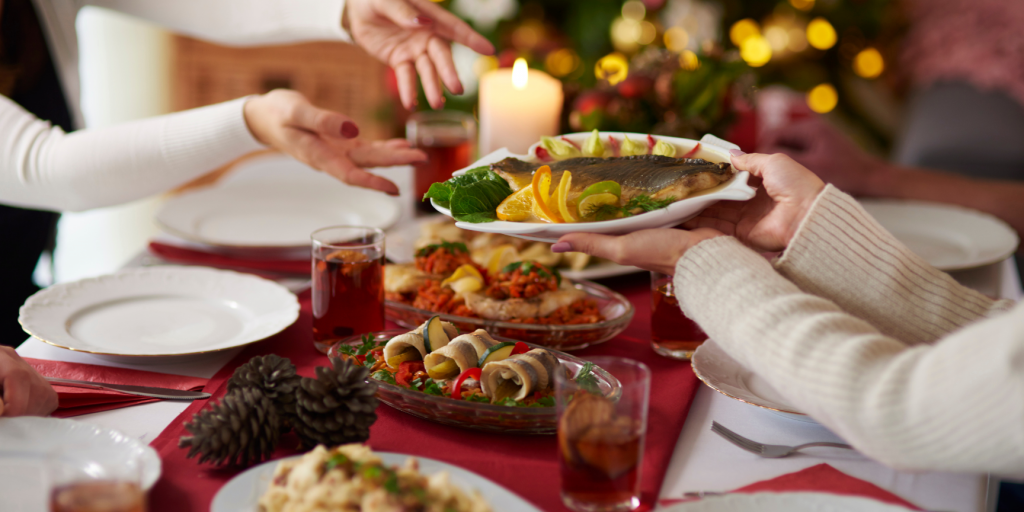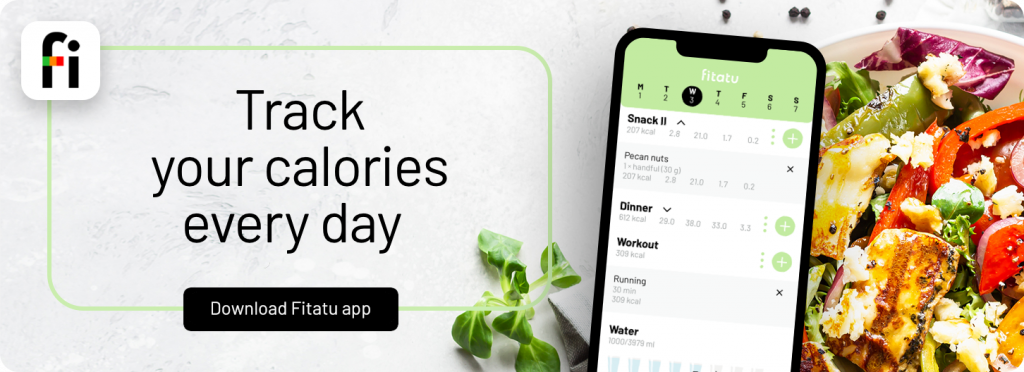Should you count calories during christmas? How to find balance and enjoy the festive season?

Christmas is just around the corner! Soon, the table will be filled with herring in oil, fried carp, cheesecake, and iced poppy seed cake. How can you balance festive “feasting” with caring for your figure? Does counting calories during this time make sense? We’ll answer these questions and share tips on how to enjoy Christmas without guilt.
Christmas is a special time for family traditions, carolling, and tables laden with food. These are moments we want to celebrate without restrictions, savouring homemade dishes with loved ones. However, the festive atmosphere often brings questions about its impact on our figure. Is the increase on the scale real weight gain or just temporary changes in the body?
Can you gain weight over christmas?
The truth is that gaining fat during the holidays is unlikely. To gain 1 kg (2.2 lbs) of fat, you’d need to consume around 7,000 extra calories. While festive foods are calorie-dense, a few days of celebrations rarely lead to such a significant caloric surplus. So, what causes the weight gain?
Water retention
Christmas dishes like marinated fish, cold cuts, and various appetisers often contain a lot of salt. Sodium, found in salt, causes water retention in the body, which can lead to a temporary increase in weight. This isn’t fat but rather an increased amount of fluid in the tissues. This effect usually subsides within a few days after returning to a moderate-salt diet.
More food in the digestive system
During Christmas, we eat larger portions and more calorie-rich meals than usual. As a result, more undigested food remains in our digestive tract. This is a natural process and does not mean immediate fat gain. After a few days, when we return to normal eating habits, our digestive system will clear, and the weight is likely to drop.
Increased muscle glycogen stores
Festive gatherings often mean eating more carbohydrates than usual—in the form of cakes, dumplings, bread, or desserts. The body stores excess carbohydrates as glycogen in the muscles and liver. Importantly, each gram of glycogen binds about 3-4 grams of water. Therefore, an increased glycogen store temporarily raises body weight. After Christmas, when we return to a standard diet and activity levels, glycogen levels will normalise, and weight will stabilise.
The festive season encourages weight gain…
That’s a fact! Often without realising it, our festive season begins shortly after St. Nicholas’ Day and ends with Epiphany. During this time—nearly a month—we often unknowingly give ourselves permission to snack.
Think about how much food and drink we consume during this festive period. What seems like small amounts at first gradually adds up—slices of cake at work parties, snacks at pre-Christmas gatherings, mulled wine with friends, leftovers from Christmas dinner to avoid waste, or drinks at New Year’s Eve parties.
These examples show how easy it is to unknowingly increase calorie intake during this time. Overeating and drinking during the festive season often lead to weight gain even before Christmas and extend the process well into the New Year.
Should you count calories on christmas day?
The answer is no! Christmas is a time to relax a little. Three days of festive “feasting” won’t dramatically change your figure. Counting calories during shared meals can take away the joy and add unnecessary stress. Instead, focus on the quality of the food and celebrating moments with family.
Should you count calories during the festive season?
The answer is yes! The festive season lasts practically a month—from St. Nicholas’ Day to Epiphany. Regular overeating throughout this period can lead to weight gain. That’s why keeping track of calories is a good idea, as it helps maintain a balance between enjoying food and taking care of your health.
Celebrate mindfully
Christmas is a time of joy and family gatherings, so don’t spoil these moments by counting calories. On Christmas Day itself, enjoy the food and atmosphere without guilt. However, the festive season lasts longer than Christmas Eve, and calorie-dense dishes can easily get out of hand.
That’s why it’s worth keeping track of what you eat during this time to maintain balance and feel good. Celebrate with joy and awareness!

Fitatu® Support Group
Reaching your goal is easier with the support of others! Join our Fitatu Facebook group and achieve your goals together with other Fitatu® app users. With the group members, you can share your results every day and motivate each other to keep going.
Fitatu® App
Not yet familiar with Fitatu®? Download the app from the Play Store or Apple Store and start taking charge of your health with us! Do you want to have access to all the recipes? Go for Fitatu® Premium! For blog readers, we have a special discount code: BALANCE. Go to https://www.fitatu.com/app/order-and-payment and claim a 20% discount on Fitatu® Premium annual plans. The code combines with other promotions.
What else can you find in Fitatu® Premium?
- Over 2,000 recipes plus dozens of new ones every month,
- additional intermittent fasting plans,
- possibility to create shopping lists,
- 6 pre-prepared meal menus,
- filtering of products and recipes,
- more synchronization with fitness apps,
- access to the app in the web version,
- no adverts!
Bibliography:
https:// www.damianparol.com/tycie-w-swieta/
https:// www.damianparol.com/jak-nie-przytyc-w-swieta/
https:// insulinoopornosc.com/tyciewswieta/
https:// www.healthline.com/nutrition/does-sodium-make-you-fathttps:// pl.wikipedia.org/wiki/Glikogen





